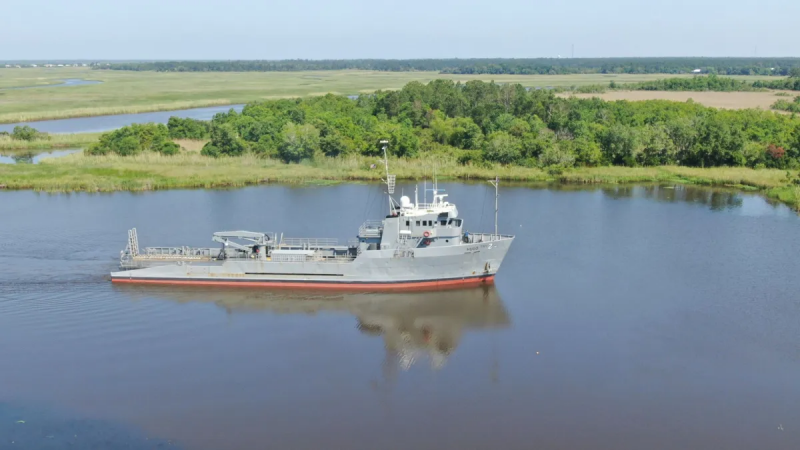The Spaceport Company has recently made headlines by securing a significant contract from the Defense Innovation Unit (DIU). This $2.5 million contract aims to advance the development of a novel launch platform that could revolutionize space access.

A sounding rocket powered by Evolution Space launches from a floating platform in the Gulf of Mexico May 22 in a test for The Spaceport Company's plans to operate floating launch platforms. Credit: Evolution Space
The award, announced May 28, will help fund the development of a prototype ocean-going launch complex built on a repurposed Navy torpedo recovery vessel. It’s part of a new DIU program called Novel Responsive Space Delivery aimed at making U.S. access to space more resilient.
The military views sea-based launch as one option to reduce vulnerability and congestion at traditional spaceports. An ocean platform could provide flexibility to pick ideal launch locations while steering clear of populated areas and rough weather.
For The Spaceport Company, founded in 2022, it’s a major milestone on an ambitious journey, said the CEO Tom Marotta.
The firm last year won $1.5 million from a separate DIU program, the National Security Innovation Capital. The contract was in support of a “Liftboat” concept for converting offshore oil rigs into floating launch sites.
The company purchased the 180-foot vessel in February and it’s refurbishing it at a Mississippi shipyard to prepare it as a launch platform for testing later this year. Marotta said the vessel’s large deck, deeper water capability, and greater mobility made it an attractive option to build a launch pad.

The Spaceport Company is refurbishing a decommissioned Navy torpedo recovery vessel to turn it into a mobile launch platform for small rockets. Credit: The Spaceport Company
The Ocean-Going Launch Complex
The project centers around repurposing a U.S. Navy torpedo recovery vessel into an ocean-going launch complex. By leveraging existing maritime infrastructure, the Spaceport Company intends to create a flexible and resilient platform for launching rockets into space. Here are the key details:
Prototype Vessel: The chosen vessel will undergo refurbishment to accommodate rocket launches. Its unique design allows it to navigate open waters while providing a stable platform for launching payloads.
DIU Collaboration: The Defense Innovation Unit, known for fostering partnerships between the Department of Defense and commercial companies, recognizes the potential of sea-based launch platforms. The DIU's investment in this project underscores its commitment to advancing space capabilities.
Novel Responsive Space Delivery: The program under which this contract falls, called Novel Responsive Space Delivery, aims to enhance U.S. access to space. By exploring innovative launch methods, the DIU seeks to reduce reliance on traditional land-based launch sites.
Advantages of Sea-Based Launches
Why opt for a sea-based launch complex? Here are some compelling reasons:
Location Flexibility: Unlike fixed land-based launchpads, ocean-going platforms can position themselves strategically. They can move away from populated areas, avoid airspace restrictions, and choose optimal launch trajectories.
Weather Resilience: Launching from the ocean provides greater flexibility during adverse weather conditions. Storms, high winds, or other atmospheric challenges won't hinder operations as much as they would on land.
Payload Options: Initially, the Spaceport Company plans to launch sounding rockets for hypersonic weapon tests and scientific research payloads. However, the long-term vision includes using the platform for small orbital rockets, expanding the range of missions.
What's Next?
The Spaceport Company aims to complete the refurbishment and testing of the vessel later this year. As it proves the viability of sea-based launches, we may witness a new era in space access—one where the ocean becomes a launchpad.


Add comment
Comments